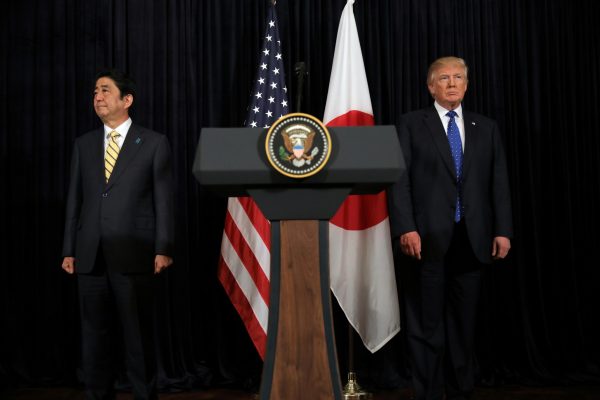Throughout the post-war era the US–Japan alliance has been a bedrock of peace and stability in the region. Under the alliance Japan provides land, sea and air facilities for the US military, and in return, the United States guarantees to protect Japanese territory. This bargain underpins security in Northeast Asia. It allows Japan to maintain its constitutionally enshrined rejection of the use of force as a means of settling international disputes. At the same time. it provides the foundation for US power projection in the western Pacific, ensuring the United States’ status as a Pacific power.
The United States and Japan have gone through tough times before: Japan’s short-lived challenge to American economic primacy in the 1980s; chequebook diplomacy absent boots-on-the-ground in the Middle East; and uncertainties over the recent security bills. But the relationship has always proved resilient.
The election of Mr Trump arguably presents the greatest threat yet to the US–Japan alliance. Trump’s isolationist stance has brought a new uncertainty to US foreign policy, and raises questions about the future of the international institutions and the rules-based order upon which Japan has depended for its security and prosperity.
For the first time since the end of the Second World War, Japan appears to have serious concerns about the long-term credibility of alliance. As Fumiaki Kubo writes in our lead essay this week, ‘Japan was stunned and alarmed on 9 November 2016 to find that Donald Trump would be the next president of the United States’.
Trump’s campaign rhetoric started ringing alarm bells in Tokyo even before his election. He repeatedly criticised Japan for not paying enough for the costs associated with hosting US troops in Japan despite the fact that Japan’s host nation support is considered the gold standard globally. Trump also took aim at Japanese trade as he complained about Japanese auto factories in Mexico as well as Japan’s not ‘allowing’ enough US cars into the Japanese market.
‘Post-election, the challenges for Japan were twofold’, explains Kubo: first, ‘to deal with President Trump, with all his unpredictability’; and second, ‘to prepare quietly for the future direction of US foreign policy’.
On the first count, Japan appears to have succeeded. Prime Minister Abe was the first world leader to meet with Trump after his election. This was followed by an official summit between the two leaders in February, soon after Trump’s inauguration.
Tokyo got almost everything it wanted. President Trump officially reaffirmed the treaty commitment to provide ‘US military support in the event of an armed attack against Japan’ including ‘defending the Senkaku/Diaoyu Islands’. At the recent 2+2 meeting between US Secretary of State Rex Tillerson and Secretary of Defense James Mattis and newly appointed Japanese Foreign Minister Taro Kono and Defence Minister Itsunori Onodera it was confirmed that Japan will maintain host nation support at roughly the 2015 fiscal level of 191 billion yen (US$1.73 billion), or about 86 per cent of the total cost. And Trump seems to have shifted his gaze away from Japanese trade, at least for now.
On the second count, the jury is still out. Despite initial success, ‘public unease remains about Trump’s Japan policy’. This is reflected by the fact that the Japanese government has sought reaffirmation of the US defence commitment on average about once a week since Trump took office (nearly 30 times so far this year).
There is evidence that Japan is seeking to repair its relationship with China as a hedge against Trump’s unpredictability. This can be seen in Japan’s newfound willingness to extend cooperation on China’s Belt and Road Initiative.
According to Kubo, in order to prepare its national defence in the face of US unreliability ‘some Japanese would welcome the withdrawal of US troops from Japan. Others might take this as a justification for developing nuclear weapons. At the moment, however, these are distinctly minority views. They would not — and should not — be embraced by the government or the broader public’.
But there are issues ‘that Japan needs to tackle on its own’. The most obvious areas, argues Kubo, are boosting defence spending and missile defence capabilities. There has been some limited movement to feel out these possibilities. The Institute for International Policy Studies, a major Japanese think tank, made recommendations to the government in January for dealing with the Trump administration including ‘that Japan spend at least 1.2 per cent of GDP on defence’. Meanwhile, the ‘Research Commission on Security of the Liberal Democratic Party proposed that Japan acquire the ability to launch counter-strikes at enemy bases in self-defence’. However, efforts to increase defence spending above the customary 1 per cent GNP cap or to alter the parameters of what constitutes self-defence beyond what was achieved the in security-related bills still face enormous domestic political barriers.
The need for Japan to quietly prepare for the future direction of the alliance comes at a time when Japan is seeking to reposition itself domestically on an array of key policy issues. These issues are explored in more detail in the latest edition of the East Asia Forum Quarterly ‘Japan repositions’. There is the unfinished business of structural economic reform to boost the economy, the empowerment of women, managing the demographic time bomb associated with an ageing and declining population, and internationalisation efforts as the country prepares to host the Tokyo 2020 Olympics.
Simultaneously managing the external security environment and domestic reform challenges will greatly test Japan’s political leaders in the coming years.
The EAF Editorial Board is comprised of Peter Drysdale, Shiro Armstrong, Ben Ascione, Amy King, Liam Gammon, Jillian Mowbray-Tsutsumi and Ben Hillman, and is located in the Crawford School of Public Policy in the ANU College of Asia and the Pacific.

